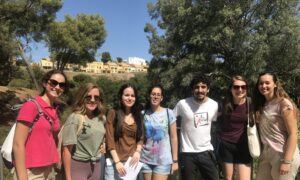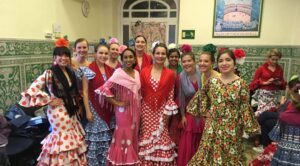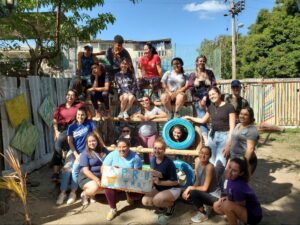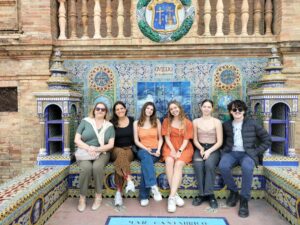
Group Exchange Language Goals
Experiencing an exchange program is a transformative and life changing opportunity where students can immerse themselves in a different culture
Estás en nuestro Instituto -> Group Exchanges página!
One of the main reasons schools offer exchange programs to their students is to allow them to cultivate cross-cultural conversation and education while encouraging a sense of global citizenship.
Intercultural dialogue impacts students personally and socially, allowing them to grow globally. Some of the key advantages of cross-cultural communication are:
Having intercultural dialogues with people from other countries help students in developing a deeper understanding of different perspectives, beliefs, and values. They can gain insights into different cultures, lifestyles, and worldviews, promoting empathy and tolerance.
The exchange between people from different cultures helps bridge gaps and overcome stereotypes, biases, and prejudices. It creates opportunities for mutual respect and appreciation.
Intercultural interactions expose students to new ideas, knowledge, and experiences. Sharing information about each other’s customs, traditions, and practices leads them to grow intellectually and broaden their horizons.
These dialogues encourage open and respectful discussions. This results in students learning to find common ground, address misunderstandings and resolve their differences, creating spaces for diverse people and communities to interact, collaborate, and celebrate their differences, stimulating social cohesion.
Intercultural dialogue helps students develop communication skills, such as active listening, effective expression, and cross-cultural understanding.
Intercultural dialogue creates a more inclusive, interconnected, and harmonious world where diversity is celebrated and embraced.

Global citizenship refers to recognizing oneself as a member of a worldwide community and assuming responsibilities beyond borders. Embracing international citizenship offers benefits like:
International citizenship broadens students’ perspectives by cultivating awareness of global issues, challenges, and interconnectedness. It helps them understand the impact of their actions globally and fosters a sense of solidarity with people from diverse backgrounds worldwide.
When students see themselves as citizens of the world, they learn to respect and appreciate different cultures, traditions, and values. It encourages them to engage in intercultural dialogue, allowing them to learn how to navigate cultural differences with empathy, tolerance, and openness.
Exchange programs help students recognize that we all share responsibility for the planet. It encourages them to take action to address climate change, protect ecosystems, and preserve biodiversity, recognizing that environmental issues transcend borders.
Embracing international citizenship opens doors to collaborative opportunities and global networks. It allows students to connect with people from various countries and backgrounds, fostering cross-cultural collaborations, knowledge sharing, and collective problem-solving.
Global citizenship enhances career prospects by developing skills such as intercultural communication, adaptability, and a global mindset, which are highly valued in today’s interconnected world. It also contributes to personal growth, expanding one’s horizons and promoting self-awareness.
By embracing international citizenship, students can contribute to a more inclusive, sustainable, and peaceful world where collective action and global cooperation are valued and prioritized.

Exchange programs abroad expose students to eye-opening experiences that will push them to develop certain skills and attitudes that they wouldn’t be able to improve while staying in their comfort zone.
Participating in exchange programs abroad allows individuals to develop various skills and attitudes contributing to personal, academic, and professional growth. Some of the skills and attitudes typically cultivated through such programs include:
Exchange programs immerse students into a different cultural environment, fostering intercultural competence. They learn to navigate cultural differences, appreciate diverse perspectives, and develop cross-cultural communication and adaptability skills.
Living in a foreign country gives students a unique chance to enhance their language skills. Through daily interactions and immersion in the language, they can improve their fluency and understanding of the local language.
Being away from home and their support systems encourages students to become more independent and self-reliant. They learn to manage daily tasks, navigate new environments, and solve problems independently. In addition, living in a foreign country involves adapting to different customs, lifestyles, and ways of doing things, developing flexibility, adaptability, and open-mindedness.
Being in a new environment usually means navigating unfamiliar situations and solving problems creatively. Studying abroad helps students develop critical thinking skills, resourcefulness, and the ability to analyze and make informed decisions in a cross-cultural context.
Experiencing an exchange program, students learn to embrace cultural differences, navigate challenges, and demonstrate respect, sensitivity, and empathy towards diverse cultures and perspectives.
Exchange programs encourage students to embrace open-mindedness and develop a sense of global citizenship. They learn to appreciate different cultures, contribute to their host communities, and recognize their role in addressing global challenges.
Overall, exchange programs provide a transformative experience that fosters personal growth, intercultural understanding, and a broader worldview, equipping individuals with valuable skills and attitudes that students can benefit from throughout their lives.

Participating in exchange programs abroad allows students to develop personal and professional competencies to enhance their personal growth and make a difference in their career prospects.
Among the wide variety of competencies that exchange programs enhance, some of the key skills typically cultivated through such programs are:
Living in a foreign country facilitates language acquisition and proficiency, a valuable skill in today’s globalized job market.
As mentioned, exchange programs foster a deeper understanding of global issues and challenges. This help students cultivate a broader perspective and the ability to think critically about international affairs.
Successfully navigating a different cultural and professional environment demonstrates adaptability, a highly demanded skill in today’s globalized workplace.
In today’s day and age, multicultural teams and cross-cultural dynamics are increasingly common. The exchange program allows students to work and collaborate with individuals from diverse backgrounds, which enhances their ability to navigate this environment.
Participating in exchange programs can develop leadership skills and the ability to take the initiative in unfamiliar settings, demonstrating resourcefulness and a proactive mindset.
These personal and professional competencies gained through exchange programs abroad can significantly enhance individuals’ personal development, and career prospects, providing them a competitive edge in today’s interconnected and globalized world.

As mentioned before, the cultural immersion an exchange program provides fosters intercultural competence among the students. They learn to navigate cultural differences, appreciate diverse perspectives, and respect and appreciate different cultures, traditions, and values. It allows them to see the world with an open mind, breaking down prejudices and stereotypes.
Prejudices and stereotypes may vary depending on the country or the culture your students immerse themselves in. However, some of the most common stereotypes are the following:
Unfortunately, prejudice based on race or ethnicity still prevails in many societies. These stereotypes and biases can lead to discrimination, marginalization, and unequal treatment of individuals or groups based on their racial or ethnic background.
Prejudice against specific cultures or cultural practices can manifest as stereotypes, generalizations, or misconceptions. It can lead to misunderstandings and a lack of appreciation for the richness and diversity of different cultures.
Prejudice based on religion can result in discrimination, intolerance, or exclusion of individuals or religious groups. Stereotypes and biases against certain religions can perpetuate divisions and become a barrier to understanding and cooperation.
Prejudice based on socioeconomic status can perpetuate social inequalities and marginalize individuals from disadvantaged backgrounds. Stereotypes regarding wealth, poverty, or social class commonly lead to unfair treatment and limited opportunities.
Prejudice against individuals who are part of the LGBTQ+ community is sadly still prevalent in many societies. This prejudice can lead to discrimination, marginalization, and violations of LGBTQ+ rights.
Through exchange programs, a wide variety of international and intercultural values are fostered among students. The most common ones are the following:
One of the fundamental values fostered in exchange programs that are key to a student’s development and growth is respect for themselves and others. Through this experience, they learn to appreciate and honor the perspectives, beliefs, and customs of others, generating an environment of mutual respect and understanding.
This experience exposes students to new experiences and cultural differences and encourages them to approach them open-mindedly. They learn to suspend judgment, challenge stereotypes, and embrace different perspectives.
Developing empathy is a key value in exchange programs. These programs encourage students to understand and empathize with people from diverse backgrounds’ experiences, challenges, and aspirations. It cultivates compassion and the ability to connect with others.
A value that we seek to cultivate among students in exchange programs is tolerance. Students learn to accept and respect differences in cultures, beliefs, and values, promoting an inclusive and harmonious environment that values diversity.

A common goal of exchange programs is to raise awareness about socially relevant topics and stimulate engagement in society and active participation. Exposing students to a different culture and social context awakes their curiosity and concern for the world around them.
Through immersive experiences and intercultural dialogue, students learn and witness firsthand current issues such as environmental sustainability, human rights, poverty alleviation, gender equality, and social justice. It fosters a spirit of active participation by engaging with local communities, volunteering, or conducting research, which leads to a deeper understanding of the complexities of social problems.
By raising awareness and stimulating engagement, these programs cultivate a generation of global citizens who are actively involved in addressing societal challenges since these experiences allow students to develop a sense of responsibility and agency, recognizing their role in shaping a more inclusive, sustainable, and fair world.
Exchange programs provide individuals with transformative experiences and equip them with the tools and motivation to make a meaningful impact, inspiring them to contribute to positive social change within their communities and beyond.
In Alandis, we employ ways to raise awareness and foster engagement in socially relevant issues by facilitating interaction between students and locals, which promotes cultural exchange and understanding. We highlight unique festivities through talks, offering a fresh perspective that broadens participants’ horizons and encourages active participation in their new communities.
Exchange programs empower students to become active citizens through valuable experiences, skills development, and exposure to perspectives that encourage their engagement and contribution to society. Some ways in which exchange programs foster active citizenship are the following:
Our exchange programs often include opportunities for community service, volunteer work, or social impact projects. Students develop a sense of responsibility in addressing societal issues by actively participating in these activities.
Living in a completely different environment and culture fosters empathy and understanding toward the challenges faced by people from different cultures and backgrounds. They develop a sense of social responsibility and are motivated to contribute positively to their communities and beyond.
These programs raise awareness about social justice issues and encourage students to fight for equality, human rights, and sustainable development, empowering them to speak out against injustice and work towards positive change.
In our experience, exchange programs have a lasting impact on students, inspiring them to maintain their active citizenship beyond the program. They engage in local and global initiatives, using the skills they developed throughout the program and their lived experiences to make a difference in their communities.
Our study abroad exchange programs always prioritize engaging and empowering young people as active citizens. By organizing talks about LGBTQ communities, we foster inclusivity and promote understanding. Additionally, we keep participants informed about events and issues through regular email updates, encouraging their involvement and enabling them to contribute meaningfully to their host communities.

Experiencing an exchange program is a transformative and life changing opportunity where students can immerse themselves in a different culture

Group exchange programs are a great opportunity for fostering cross cultural understanding and appreciation for other cultures These programs offer

Group exchange programs are life changing experiences where students embark on transformative journeys broadening their horizons and fostering cross cultural

When planning and organizing a group exchange program for your students one of the steps is to carefully consider the

When planning an exchange program one of the first steps is to set the objectives of the experience It will

The safety and well being of students when they travel academically is one of the
Planning a group exchange?
¿Dónde debemos enviarle el folleto?
Receive travel and education information directly in your inbox
Where should we send you it?
Receive your brochure
¿Dónde debemos enviarle el folleto?